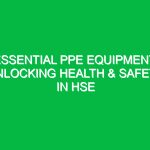Welcome team,
Today, we are going to delve into a crucial topic that is essential for our Health, Safety, and Environment (HSE) practices – Hydrogen Sulfide. Understanding the risks associated with Hydrogen Sulfide is vital for ensuring a safe working environment for all of us. Let’s explore the dangers, precautions, and best practices related to this hazardous gas.
The Basics of Hydrogen Sulfide
Hydrogen Sulfide, often referred to as H2S, is a colorless, toxic gas that is commonly found in various industrial settings, including oil and gas production, wastewater treatment plants, and agriculture. Exposure to even small concentrations of this gas can be extremely dangerous, leading to health complications or even fatalities.
Potential Hazards of Hydrogen Sulfide
One of the key dangers of Hydrogen Sulfide is its ability to affect the central nervous system, leading to symptoms such as dizziness, nausea, and in severe cases, unconsciousness or death. It is crucial to be aware of the signs of exposure and take immediate action in case of any suspicion of H2S presence.
Preventive Measures and Best Practices
When working in areas where Hydrogen Sulfide may be present, it is essential to follow strict safety protocols. This includes wearing appropriate personal protective equipment (PPE), conducting regular gas monitoring, and implementing effective ventilation systems to minimize exposure risks.
Key Safety Guidelines
- Always conduct a thorough risk assessment before starting work in potentially hazardous environments.
- Attend regular H2S safety training sessions to stay updated on best practices and emergency procedures.
- Immediately evacuate the area if H2S is detected or suspected, and alert others to do the same.
Real-Life Scenario
Imagine you are working in a confined space and suddenly detect a rotten egg-like smell. This odor could indicate the presence of Hydrogen Sulfide. What steps would you take to ensure your safety and that of your colleagues?
Regulations and Compliance
It is important to adhere to all relevant regulations and company policies regarding Hydrogen Sulfide exposure. Compliance not only ensures our safety but also helps us meet legal obligations and maintain a responsible work environment.
Conclusion
As we conclude this Toolbox Talk, remember that your safety and well-being are our top priorities. By understanding the dangers of Hydrogen Sulfide and following the prescribed safety measures, we can create a secure working environment for everyone. Thank you for your attention and commitment to safety.


